PrivateVPN is an enticing VPN service with plenty of interesting features and some unique choices. This provider is based in Sweden and it’s been around for quite a while. However, compared to its rivals, in this PrivateVPN review, you’ll see that it hasn’t improved a lot over the years.
In fact, the provider looks a bit basic if we’re honest. Its user experience isn’t the best. On the other hand, PrivateVPN promises exceptional security, solid privacy, and even some streaming capabilities.
In addition, the provider promises to store no logs and even offers customer support that lets you talk to its developers directly. As an interesting choice on the market, our PrivateVPN review for 2025 is surely going to be a proper read for people interested in this service.
We’ll check not only how safe and secure it is. Instead, we’ll also demonstrate how its apps function, talk about in-app security features, check its speeds, and much more. We recommend grabbing something to eat or drink and reading on – we have plenty to go through!
The 3 best alternatives to PrivateVPN:
7492 servers
118 covered countries
30 days money-back guarantee
10 simultaneous connections
9.8 /10
3000 servers
105 covered countries
30 days money-back guarantee
8 simultaneous connections
9.4 /10
12000 servers
100 covered countries
45 days money-back guarantee
7 simultaneous connections
9.2 /10
PrivateVPN User Experience & Device Support
As stated at the beginning of our PrivateVPN review, the service isn’t going to give you an exciting user experience. Its apps aren’t the most polished but the good news is that they’re functional and bug-free. For the most part, at least.
Now, when talking about its app compatibility, some major improvements are there. A few years ago when we tested this provider, it wasn’t available for all platforms and systems. In 2025, it is, and you can easily set up this VPN on macOS, Windows, iOS, Android, or even Linux.
When talking about Linux, PrivateVPN works on Ubuntu and a few other distros, so support for this system is decent. Albeit, we found ExpressVPN’s Linux support to be a tad better. Nevertheless, PrivateVPN at least offers a decent number of simultaneous connections.
We’re talking about 10 connections per subscription and this, if you ask us, is a pretty good number. For comparison, ExpressVPN offers 5, NordVPN 6, and CyberGhost 7. The only better provider in this regard is Surfshark which offers unlimited connection per subscription.
Desktop and Mobile Apps
When you subscribe to PrivateVPN, you’ll get an option to download the VPN to your device. Most likely, you’re going to use Windows/macOS or Android/iOS. We tested the service on Windows and its application looks like the one displayed in the screenshot below.
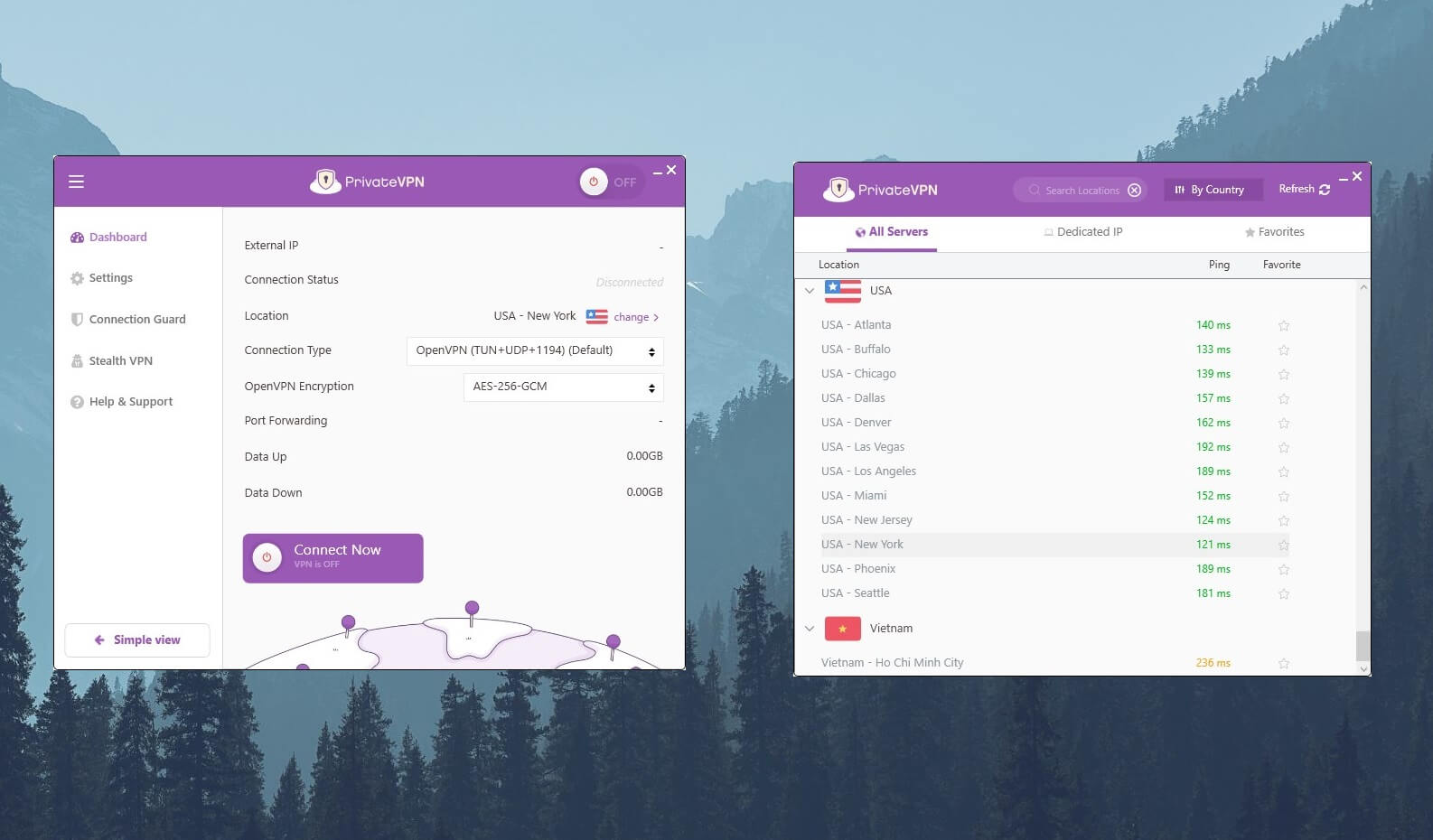
The app opens in a so-called simple view, where you only see the connection button and have the option to open the server list below. We prefer this advanced view, however, with a larger window that covers all of its features and options.
The home screen, in this case, shows you the selected location, the level of encryption, and the protocol you’re using. To connect, hit the “Connect Now” button. PrivateVPN will take a bit of time to connect, as it uses OpenVPN, with no WireGuard, so the connection time is longer than 3-4 seconds.
Nevertheless, the left side is reserved for various features and settings and the server list, when opened, is stationed in another window. We’d like it to be in the same window, though, as two large windows take up a good amount of space on your screen.
During our PrivateVPN review, we had no problems with the app on Windows, to be frank. In fact, we also installed it on our Android phone (Samsung) and the provider showed a decent performance. Albeit, we still think the app could use some polishing, especially compared to ExpressVPN.
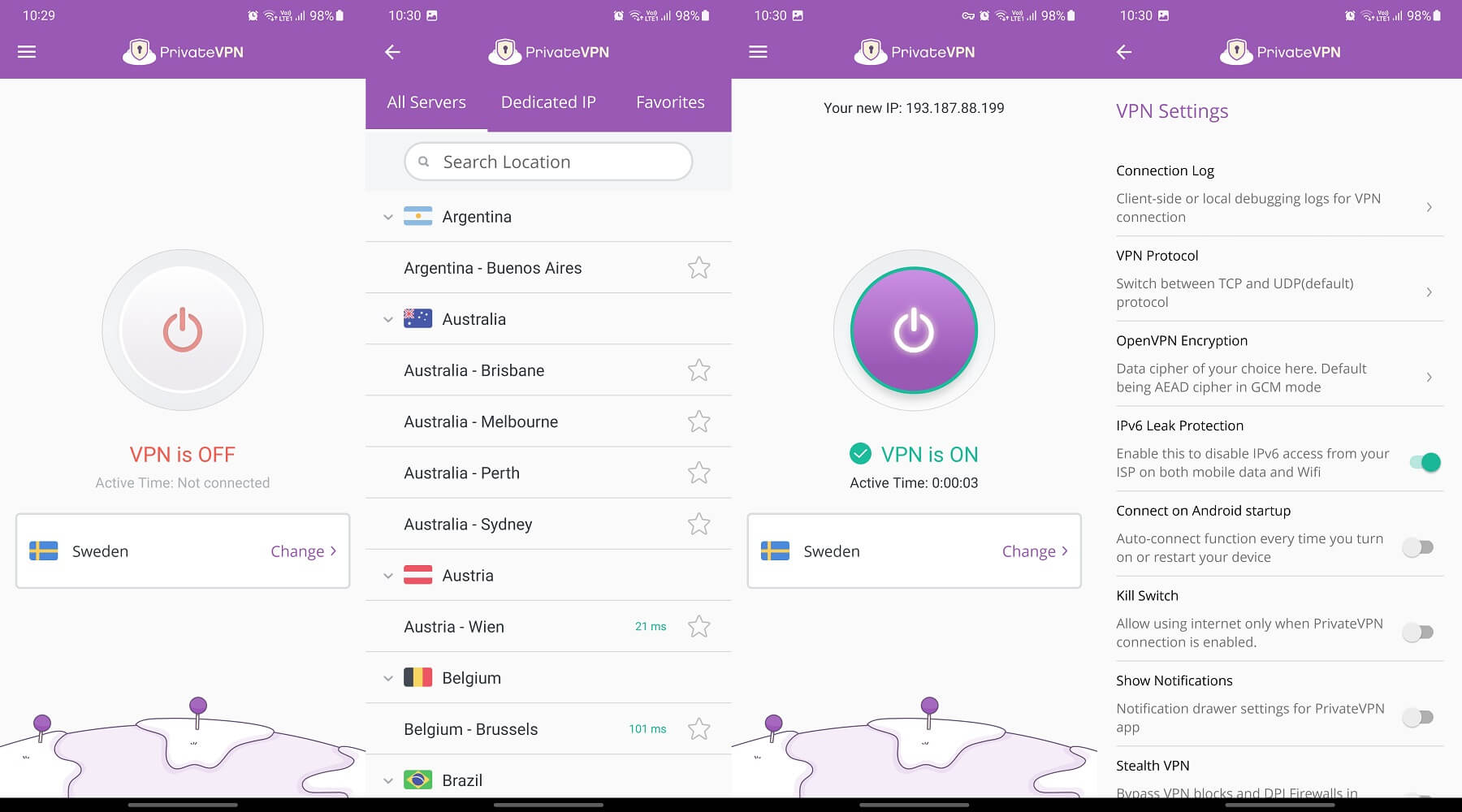
ExpressVPN’s mobile app is much smoother and snappier. Aside from better optimization, this VPN also uses Lightway, which ensures much shorter connection times, and thus, makes the app quicker.
TV Apps
The good thing is that the provider didn’t skimp on TV-focused apps. In our PrivateVPN review for 2025, we were pleasantly surprised with the number of apps for TVs. PrivateVPN works on Firestick TV, offering a great native app that works flawlessly.
Android TV VPN apps are also here, so if you’re using a TV from Philips or Xiaomi, for instance, installing and using this service will be simple. All you have to do is go on Google Play, search for PrivateVPN, and install it. This can be said about Nvidia Shield TV as well.
We like that PrivateVPN is a solid choice for many other streaming-related systems and devices too. One of its best features is support for Kodi and devices like Apple TV or Chromecast. However, for the last two, you’ll have to install it on a router, which we’ll discuss in just a minute.
Gaming Apps
When thinking about PrivateVPN, gaming surely isn’t on top of your mind. But we wouldn’t discard it immediately. PrivateVPN can be used with gaming consoles such as Xbox or PlayStation but also with Nintendo and Steam Deck.
Of course, the provider has no dedicated apps for them because consoles don’t support VPNs natively. Instead, there’s again the option to install it on a router or share your VPN connection from the PC to the console through the LAN cable or wirelessly.
Router Support
Lastly, we should talk about its router compatibility. PrivateVPN indeed works on routers and on its app, you’ll find that it supports them. The problem, at first, is that its router-related page is more “general”, which means it just says it’s a VPN for routers and prompts you to subscribe.
However, if you do a quick search online and type “PrivateVPN Router”, you’ll see an in-depth guide on how to install the provider on this device. In this guide, the provider shows you several steps and points out that it supports OpenVPN, PPTP, and L2TP protocols.
Also, we learned that it supports the following routers:
- ASUS RT
- Synology
- DD-WRT
- Tomato
- Linksys
- QNAP
- pfSense
You’ll get guides for each of these models depending on the protocol you want to use. ASUS RT models support OpenVPN and L2TP, Linksys is compatible only with L2TP, and Synology routers can use OpenVPN and PPTP protocols.
PPTP isn’t our favorite, though, as it’s outdated by now and definitely less secure. On the other side, it’s pretty fast, which is an advantage if you prioritize the performance.
Is PrivateVPN Safe & Secure? All Security Features Examined!
Many people wonder whether VPNs are safe and secure? Well, in most cases, they are, except if we’re talking about those that aren’t! All jokes aside, PrivateVPN is safe and secure and in our review, you’ll see why.
Multiple Levels of Encryption
For the start, it’s vital to talk about encryption. When you hear the word encryption, you usually think about the data protection that VPNs have. That’s right! They pretty much always use so-called military-grade encryption, also known as Advanced Encryption Standard or AES.
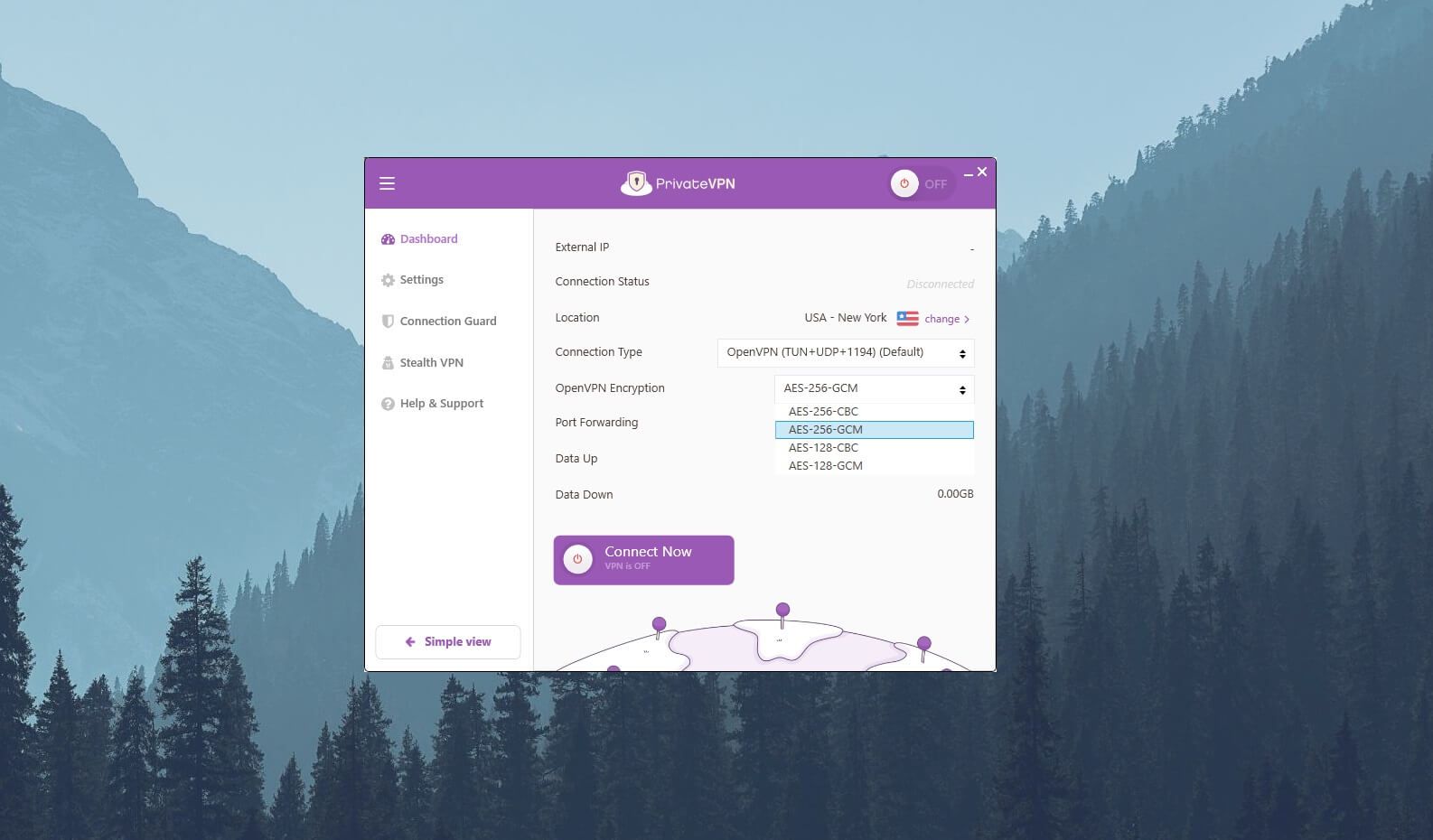
256-bit AES encryption is the most typical standard but PrivateVPN lets you choose from a couple of them. At the time of writing this PrivateVPN test for 2025, we discovered 4 levels of encryption:
- AES-128-GCM & 256-GCM
- AES-128-CBC & 256-CBC
GCM or Galois/Counter Mode is a better option here but it’s more resource-taxing. CBC is slightly less safe, although it’s still rock-solid. We recommend using GCM, except if you want to save your laptop battery or simply use fewer resources on your mobile device or computer.
Either way, we tested both encryption standards, and honestly, the difference is barely noticeable – if at all. Simply select AES-256-GCM and you’ll be all set.
OpenVPN Support
One of the major downsides of PrivateVPN is the lack of WireGuard. The provider is established in 2008 and after 15+ years of existence, it still hasn’t introduced WireGuard like most providers did. Why? We aren’t exactly sure but we know we aren’t so happy with it.
OpenVPN, PPTP, and L2TP protocols are here, although, on the site, you’ll find manual setup guides for IKEv2 on Windows and iOS. In addition, OpenVPN is a bit more customizable in its Windows app. By default, it uses the UDP protocol with port 1194 and the TUN driver.
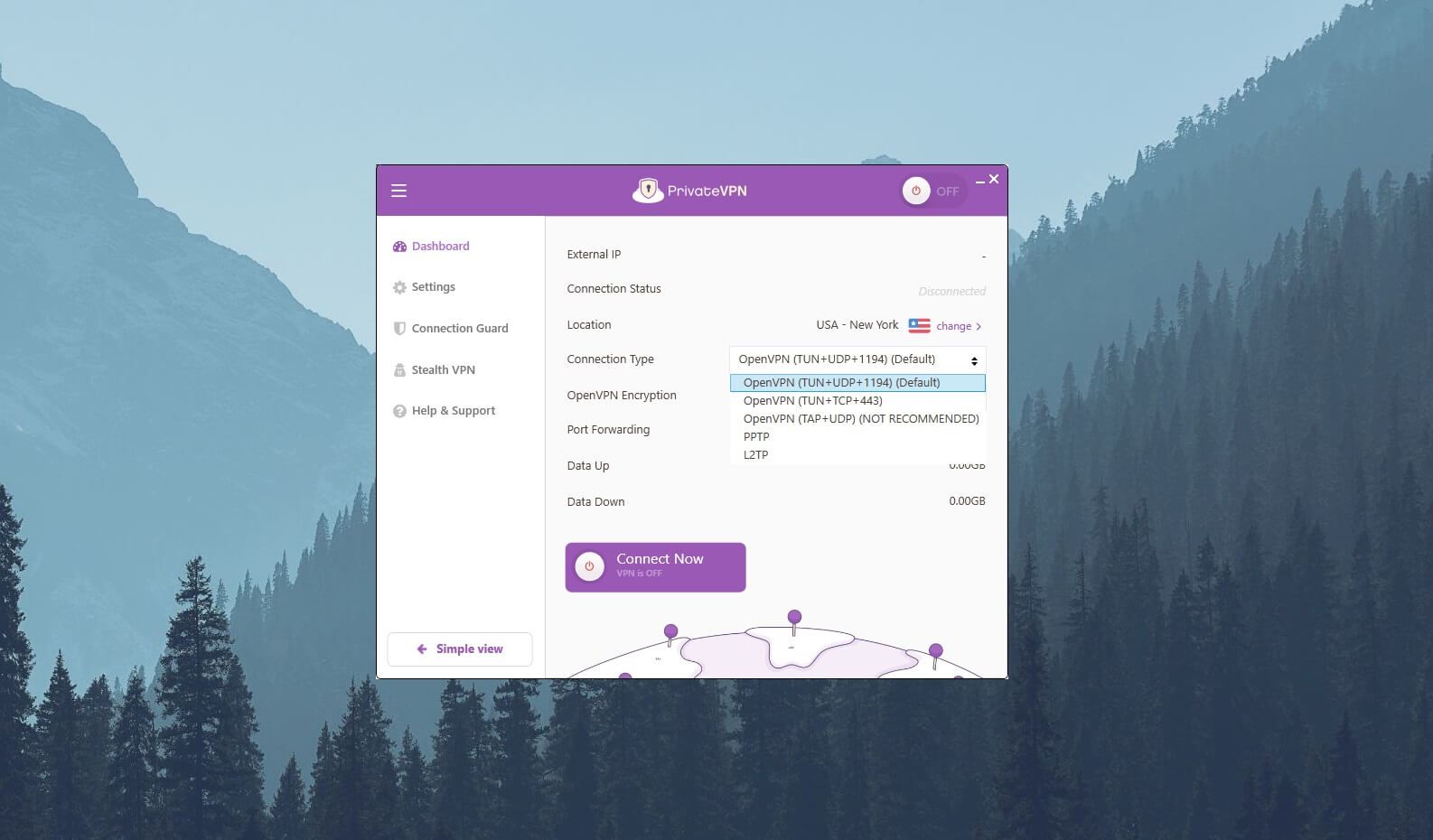
However, users can opt for OpenVPN TCP with port 443 instead. PrivateVPN has another option with OpenVPN UDP but this time, with the TAP driver, which it doesn’t recommend. Our team stuck to the default option but with AES-256-GCM encryption and had no security issues.
Even the L2TP option works well, although we’re strongly against its longer connection times and average speeds produced by these outdated protocols. PrivateVPN should include WireGuard or at the very least, come up with a proprietary protocol like NordLynx from NordVPN.
Although, with the recent update, WireGuard is available in PrivateVPN but you need to set it up manually and you can only use up to 8 config files. Plus, you’re limited with the choice of locations, as not every country on its server list is supported.
Connection Guard
In this PrivateVPN review for 2025, we had the pleasure of testing and using Connection Guard. It’s basically a fancy name for a set of mandatory VPN features, such as:
- IPv6/DNS leak protection
- Kill switch
- Application Guard
The first feature needs no special explanation. It’ll keep your IPv6 and DNS addresses safe and secure, preventing any potential leaks. The kill switch will prevent you from leaking your private data by disabling all traffic upon connection loss.
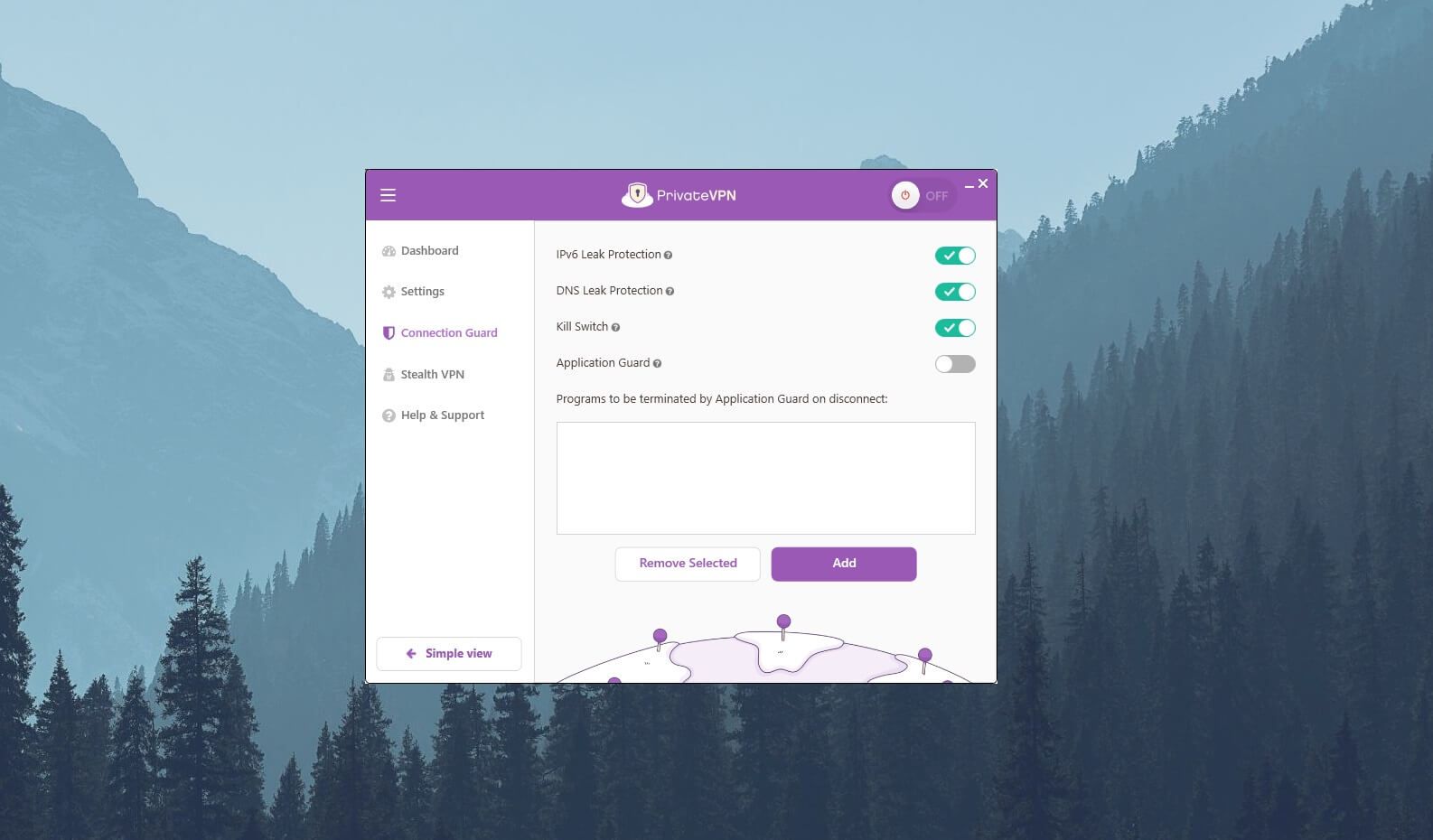
This feature worked only once during our review, as this was the only time we lost a connection for some reason. Now, Application Guard is a bit like a kill switch but not exactly. It’ll terminate the selected apps when the VPN is disconnected, preventing data leaks in these apps.
To put it simply, it’s an app-oriented kill switch that won’t impact your entire system but just these applications. We found that it’s useful for torrent clients, for instance, where keeping your IP private is a must at any given moment.
Stealth VPN
Stealth VPN is another useful feature that works… well, okay. PrivateVPN won’t be your go-to option in China for sure but bypassing DPI Firewalls and mild VPN blocks will work. Stealth VPN obfuscates your VPN traffic and makes it look like normal traffic as if you aren’t using a VPN.
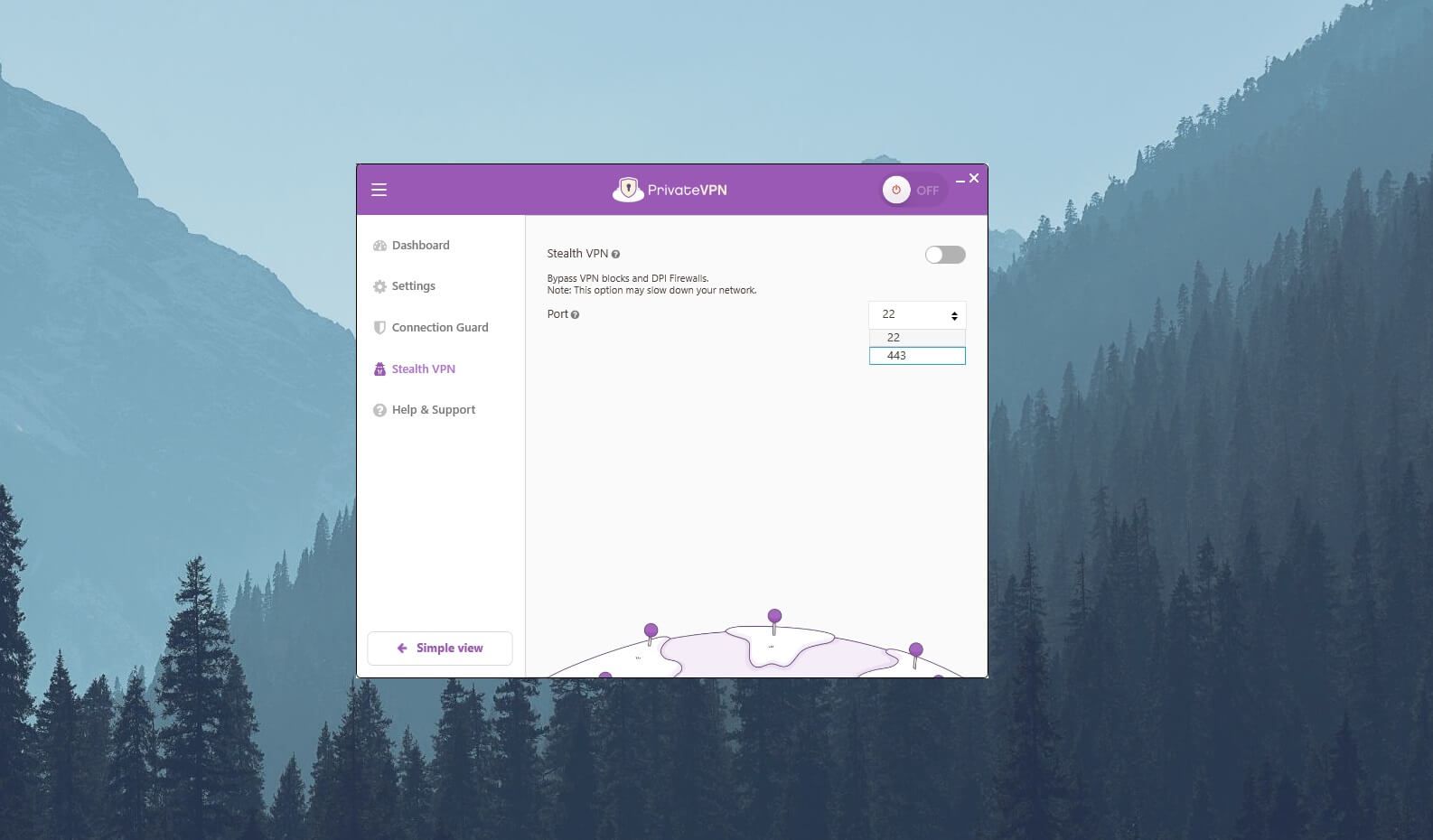
As a result, it can bypass deep-packet inspection and let you circumvent annoying firewalls. You’ll just need to enable it in the app and then select the port you want to use. By default, it’s port 22 but PrivateVPN also lets you go with port 443, which is a very popular option.
Port Forwarding
Last but not least, PrivateVPN offers port forwarding. If you’re not sure what it is, check our port forwarding guide. In simple terms, it’ll let you open particular ports on your router, which reduces your firewall level but gives you faster speeds when torrenting, for instance.
Port forwarding needs to be requested through the site, so you can’t enable it in the app immediately. Whatever the case, we don’t recommend using it, as it creates some unwanted privacy risks that you shouldn’t subject yourself to.
IP and DNS Leak Test
Despite PrivateVPN offering IP and DNS leak prevention, we never take anyone’s words for granted. And neither should you. Because of our review policy, we tested PrivateVPN on two sites – ipleak and browserleaks while using OpenVPN, where we got some great results.
First, we connected to a US server with PrivateVPN and then visited ipleak.net. The results below show that no leaks are present and our native IP/DNS addresses are fully replaced with the same address in the United States.
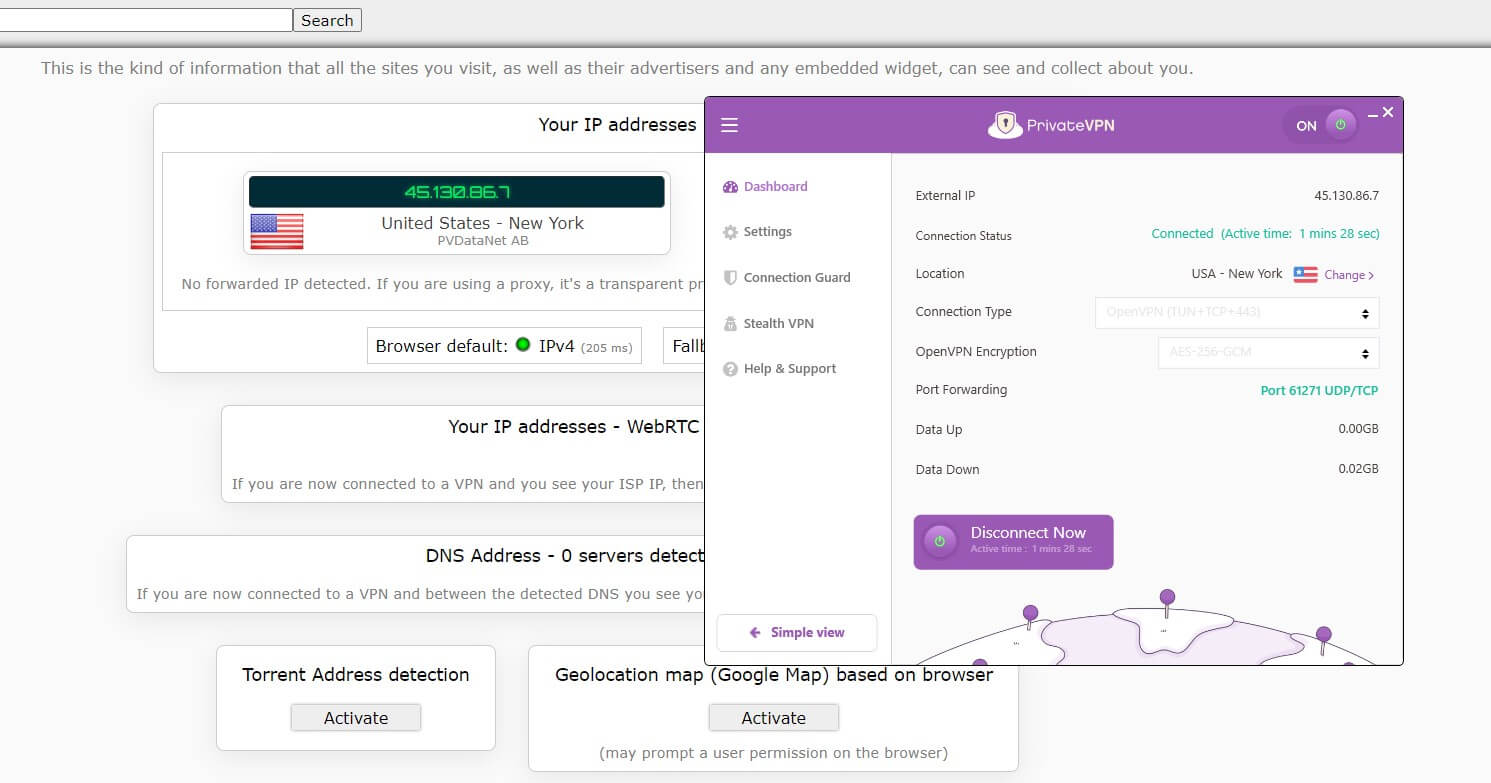
Moving on to browserleaks.com, we saw the same. The US IP/DNS addresses are in place, and this more in-depth test also showed that no WebRTC leaks are ruining our privacy.
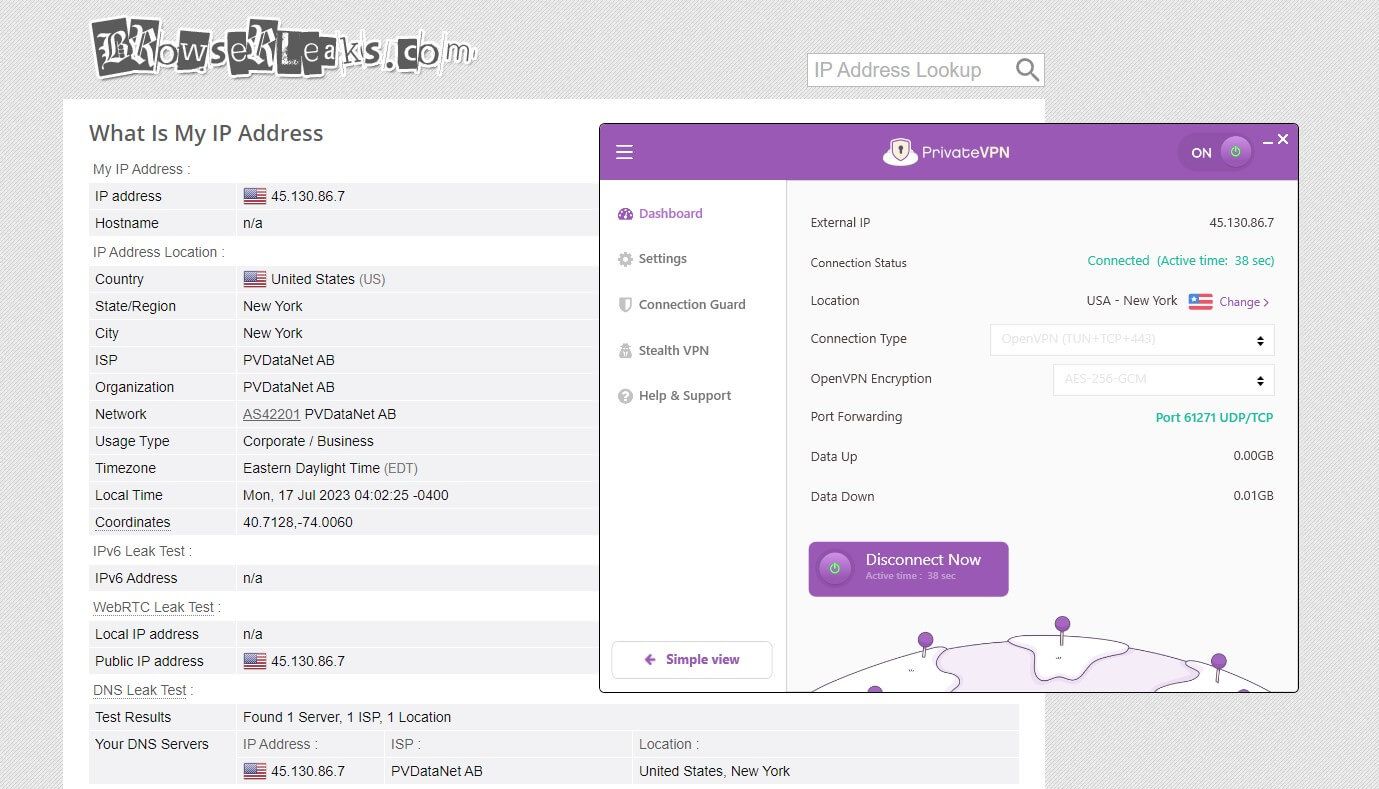
That said, our leak tests are more than successful and PrivateVPN passed them with flying colors.
Does It Have a No-Logging Policy?
Okay, so what about logging? Well, PrivateVPN has some exciting promises in this regard but as always, it’s better to be safe than sorry. In other words, we had to take a peek at the privacy policy. First, PrivateVPN is based in Sweden.
Unlike Switzerland, Sweden is a part of the 14 Eyes alliance. Basically, there are 14 countries, including the US, the UK, and many others, that employ ISP surveillance country-wide, resulting in a lower level of privacy. These countries also share data with each other and often coerce VPNs to store logs.
If a VPN is outside of the 5/9/14 Eyes alliance, it’s usually a good sign, as there aren’t intrusive data retention laws. That’s why ExpressVPN keeps no logs as it’s in the British Virgin Islands, while Betternet, an American VPN, actually does.
Which Information Is (and Isn’t) Stored?
We always like it when the privacy policy is short and no words are wasted on useless and irrelevant data. Generally speaking, the privacy policy is okay, although it hasn’t been updated in a while. But things are simple here. PrivateVPN stores no logs.
By “No logs”, it refers to your IP address, DNS queries, browsing history, traffic destination, connection timestamps, used bandwidth, etc. When talking about the information it stores, we can mention basic stuff like on-site cookies that track your activities only on its site.
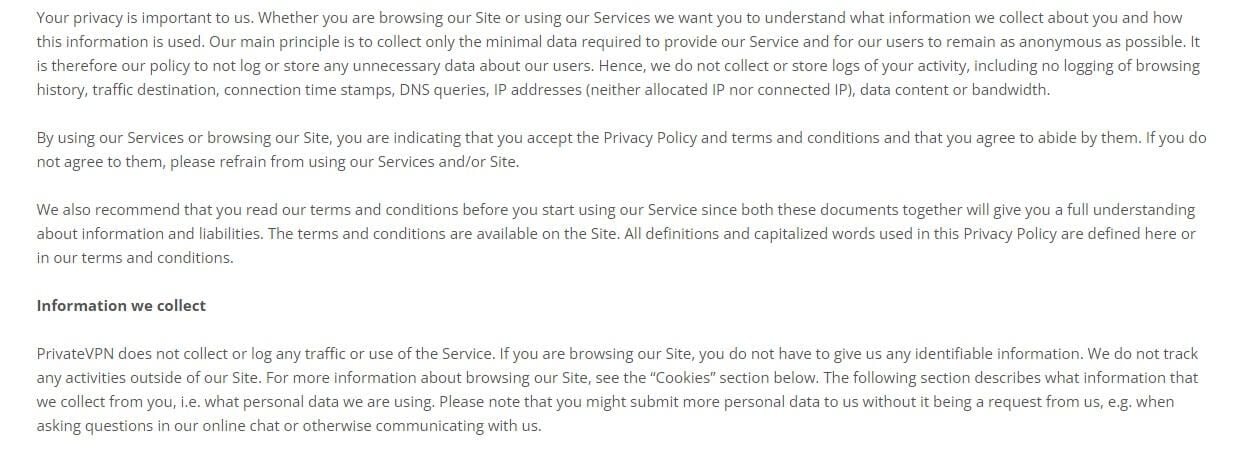
In addition, there’s payment information, your email address, and support-related data if you contact the company regarding a particular issue. Also, the provider states that it won’t disclose your private data to third parties, which is always important.
Our only gripe is that there aren’t any third-party audits on PrivateVPN. While its privacy policy might be genuine and the provider might not store any logs, there’s no audit to prove these claims. Such a shame, as the audit would make this provider infinitely better.
If that’s a big issue for you, we can recommend ExpressVPN, CyberGhost, or NordVPN. These providers have at least one audit from PwC, Deloitte, KPMG, or Cure53, all of which are large and reputable auditors in the VPN world.
PrivateVPN for Streaming: Popular Platforms TESTED
PrivateVPN should make getting over geo-restrictions simple enough. After all, it says so on the site and even supports various streaming devices and systems.
Well, we don’t want to be bearers of the bad news but sadly, PrivateVPN is kind of disappointing when discussing streaming.
We first tried unblocking Netflix US by using the OpenVPN protocol with AES-256-GCM encryption. Much to our dismay, we couldn’t make it work no matter what we tried. PrivateVPN isn’t detected – it’s just that we can’t find one of many Netflix-US-based shows we search for.
We then switched to PPTP and even L2TP, only to get the same results. After doing that, we switched to another American server, cycling through multiple protocols – once again, this was futile. Even worse – the provider couldn’t unblock a single library of this platform for unknown reasons.
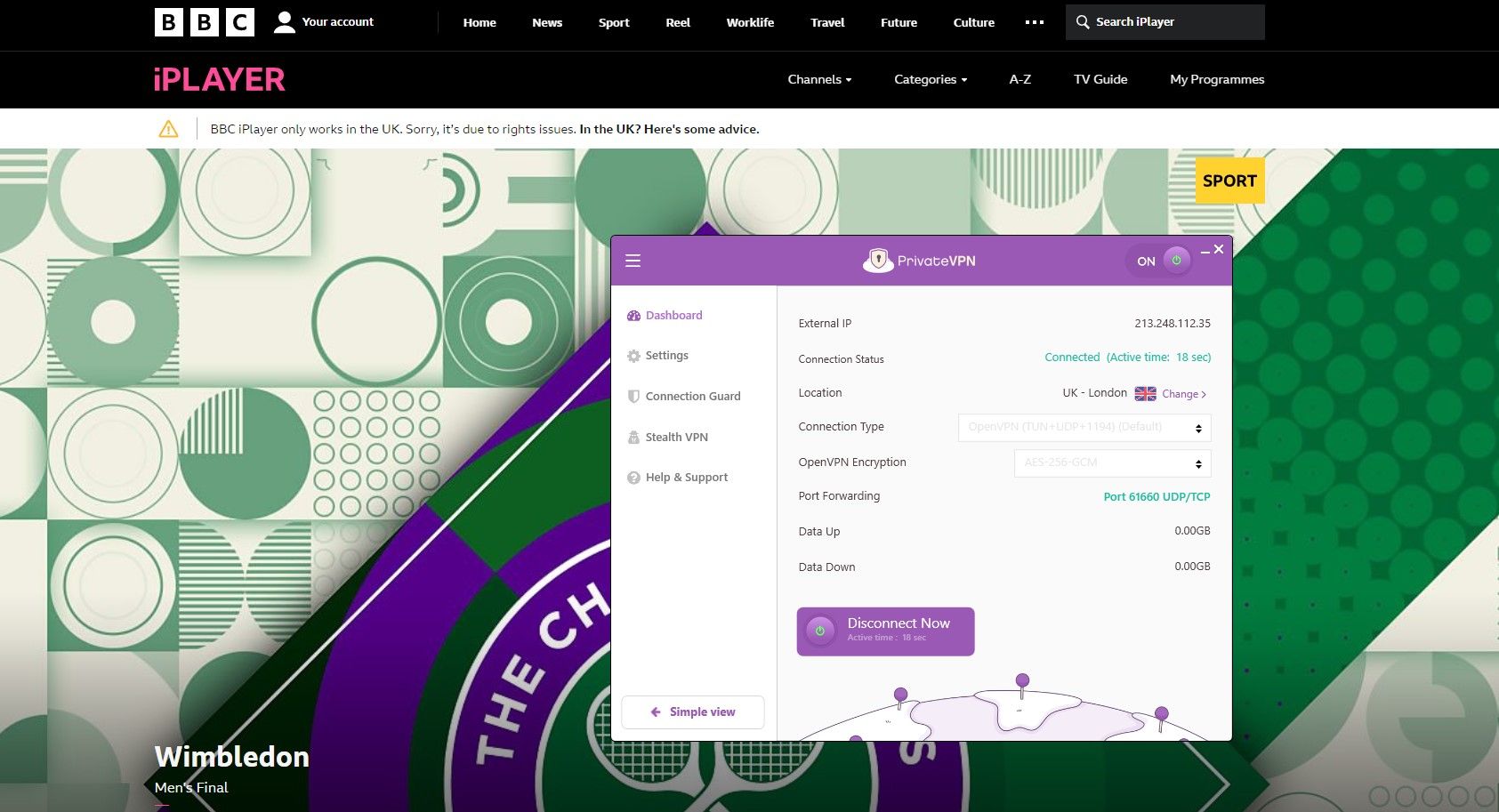
While it does work with a few foreign TV channels, we also found it inconvenient for unblocking BBC iPlayer (a free channel that allows you to watch Wimbledon, but not only).
We lost plenty of time trying to switch between protocols and using both UK locations but to no avail. Let’s not forget its slow connection speeds, making the connection process last for quite a while.
Platforms, or better said, channels that worked provided a pleasant experience. We had no problems watching them in high quality and without buffering. But that’s all in vain because the provider can’t unblock popular streaming portals people will most likely expect.
For comparison, NordVPN works with BBC iPlayer and it can access a plethora of Netflix catalogs. More information can be found in the PrivateVPN vs NordVPN duel. ExpressVPN can do the same and CyberGhost with its dedicated streaming servers is yet another awesome provider better than PrivateVPN.
Speed Tests: Here’s How Fast PrivateVPN Really Is
Speed-testing PrivateVPN in our review was quite a long process. Thanks to a few protocols with several layers of encryption, we repeated every test multiple times. In general, we have a rule which involves testing the provider 3 times a day, 3 days in a row.
We also include 4 locations, such as the UK, the US, Australia, and Japan. However, we tested PrivateVPN for more than a week, just to see when it’ll be at its fastest. Of course, PPTP seems to be the fastest protocol here and its connection times are almost instant – boom!
OpenVPN and L2TP establish connections much slower. However, since PPTP isn’t great security-wise, we still decided to make our “main” test the one with the following parameters:
- Protocol: OpenVPN (TUN+UDP+1194). UDP is faster than TCP, after all, and it’s a default protocol recommended by the provider.
- Encryption: For encryption, we still used AES-256-GCM rather than 128-bit variants. According to our testing, no speed differences were present. At least no noticeable ones.
Before we display our test results, it’s good to check our native internet speeds and remember our location in Eastern Europe:
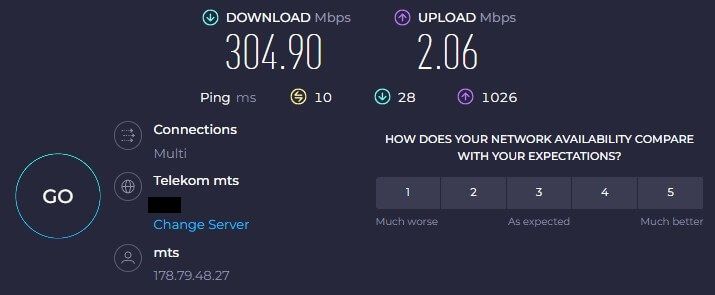
And now, with that out of the way, let us check the speed test results from other locations:
UK:
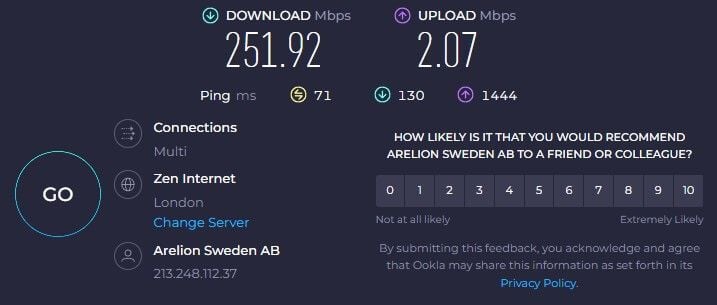
US:
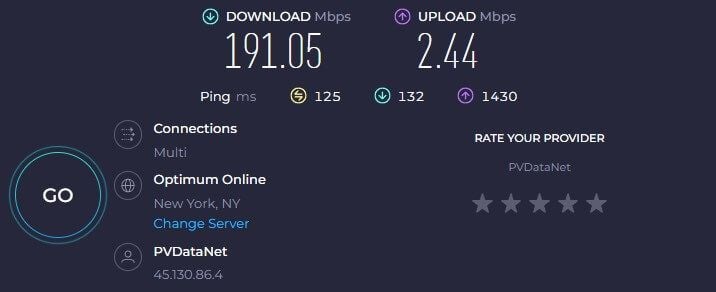
Australia:
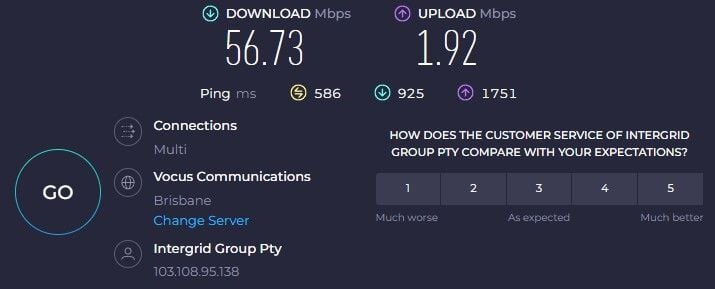
Japan:
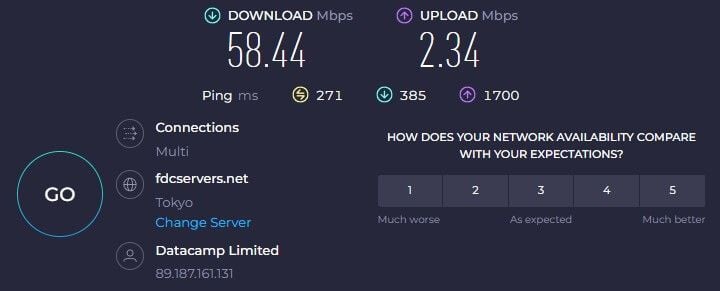
As you can see, the speed reduction wasn’t very dramatic. With OpenVPN and the UK server, we still encountered decent enough performance. The US server started showing a bit of a speed decrease, especially when talking about increased latency.
Australian and Japanese servers are, as expected, the worst. Their latency is a bit too high for our taste (up to 586 ms) and download speeds are now severely crippled. It’s far from the fastest VPN but it’s definitely not as slow as some of the free providers we tested.
Is PrivateVPN Good for Gaming?
With the level of performance that you’ll get from PrivateVPN, gaming isn’t going to be the most enjoyable experience. We tested it on Windows where we played games like Warzone and Fortnite. This was enjoyable enough when using a server close to us – like Germany or France, for example.
Switching to Asian servers made the task of gaming with low ping a bit harder. For fast-paced games, this is a big deal, as lagging will make the game virtually unplayable. Another thing is that PrivateVPN’s PPTP protocol is a bit better for gaming.
It’s significantly faster but isn’t very secure, so you might still be prone to DDoS or swatting attacks. What about cloud gaming? In this case, we really don’t recommend PrivateVPN. With a noticeable input lag and slower speeds, getting a quality gaming experience without visual glitches is almost impossible.
For this purpose, ExpressVPN and CyberGhost seem to be a lot better. They’re faster, offering more servers to pick from, which results in a more varied gaming session. On top of that, they’re superior security-wise, so gaming sessions will be completely safe.
Can I Use PrivateVPN for P2P and Torrenting?
In our PrivateVPN review, we realized that the provider has a small server fleet. When talking about torrenting, this surely isn’t exciting, as small server parks tend to be overcrowded. This happens with ProtonVPN and its 3 free server locations with an average load of 90%
However, PrivateVPN isn’t overly popular and its torrenting capabilities are actually decent. All of its servers are capable of torrenting and the provider doesn’t limit you in any way. All you have to do is connect to any server, visit a torrent site, and start downloading.
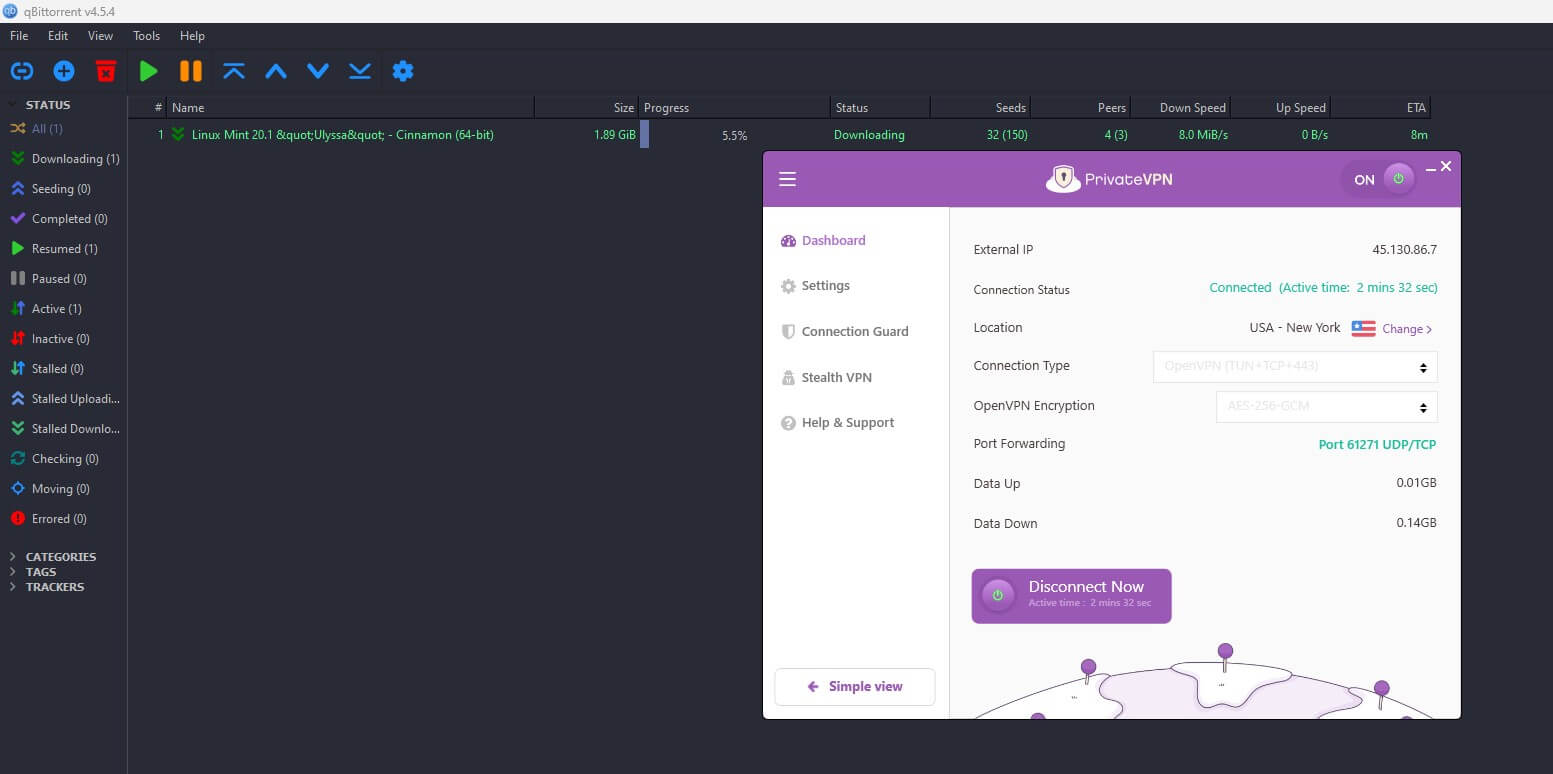
We like that PrivateVPN is pretty fast in this regard. Sure, it’s not the fastest provider, as you saw, but when using a server in the vicinity, we had no problems downloading anything we wanted. Let’s not forget about port forwarding, which some of you will find beneficial.
It will accelerate your downloads and uploads, making it perfect even if you’re often seeding torrents. On top of that, the provider offers the SOCKS5 proxy for all of its servers. It’s port 1080 for each server, as displayed on the server list on the site.
The SOCKS5 proxy can also be used for torrenting and it’s actually a safe option – to a point. It has additional authentication and is pretty fast, but not faster or safer than a VPN. Finally, the service also has HTTP proxies on port 8080 with every server, just in case you want to use them.
Is It Working in China & Other Censored Countries?
PrivateVPN’s strong side was never bypassing censorship or working in China. Have you ever heard about PrivateVPN getting over the Great Firewall? While some users claim that the provider works thanks to Stealth VPN, in 2025, the situation is a bit worse but still good.
Namely, during our review of PrivateVPN, we tested the provider in China thanks to several of our testers in this country. We detected that thanks to Stealth VPN, PrivateVPN will actually work approximately 7 out of 10 times.
Remember that Astrill VPN also offers Stealth VPN and in this provider, this protocol works particularly well. PrivateVPN’s Stealth solution is surprisingly decent, as it utilizes the Shadowsocks proxy through which your traffic is routed. It’s not obfuscation in the “traditional” sense.
For instance, Astrill VPN has this OpenWeb protocol, which does rely on obfuscation and is yet another solution to get over the Great Firewall. PrivateVPN instead relies only on Shadowsocks, which is a proxy, and therefore, isn’t as safe as the VPN connection with traditional obfuscation.
Regardless, the service has at least 70% uptime in China compared to Surfshark with 20% or so in 2025. So, to conclude this part of our PrivateVPN review, we can say that it works in China, and by extension, in countries like Russia, the UAE, Turkey, and others.
Servers and Server Locations
PrivateVPN’s server selection is comprised of physical and virtual servers. Of course, the majority of them are physical but some – around 10-15% – are virtual locations. Is that an issue? Not at all, as there’s another, much more prevalent issue we need to mention.
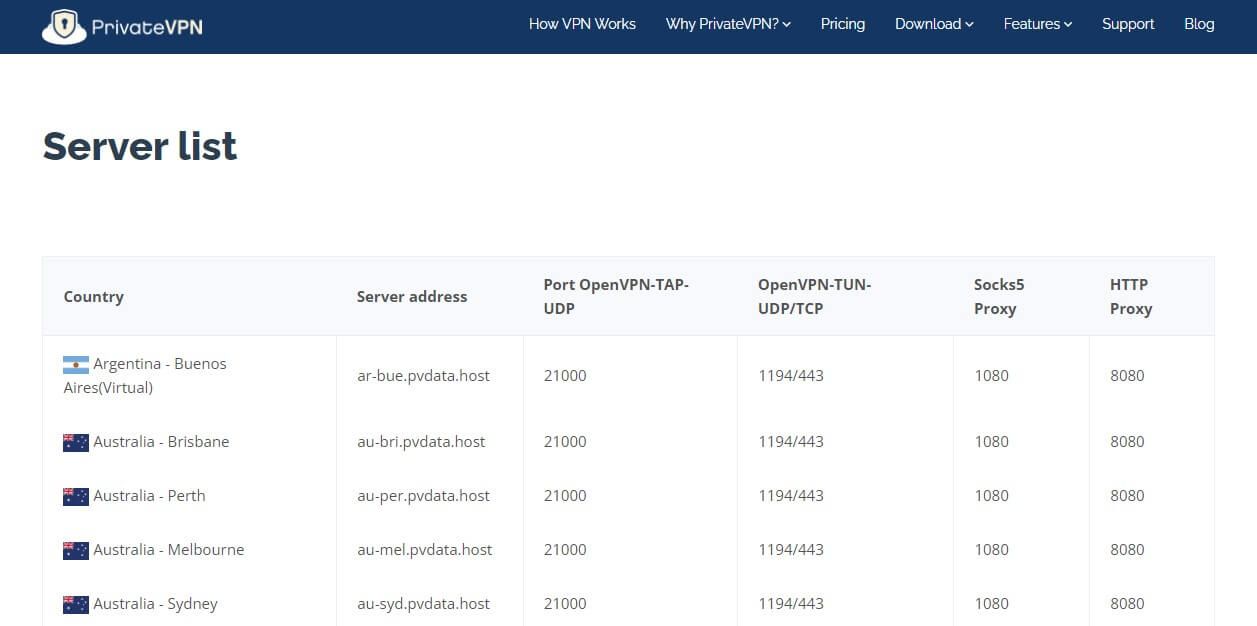
Namely, PrivateVPN is a mainstream service, which means it enjoys a solid level of popularity. However, it only has 200 or so servers in 63 countries. 200 servers are simply TOO small for this kind of VPN and even Windscribe in its free version has more.
Heck, even TunnelBear with its annoying 2 GB bandwidth limit offers 500+ servers! We think that TunnelBear is a poor VPN for sure, and PrivateVPN has some excellent features. That said, it’s a shame that the provider didn’t improve its server fleet over the course of 15+ years.
Most of its servers are stationed in Europe but only 2 server locations are in Africa. On a good note, the service has decent US-based servers, which makes it great for unblocking US TV or online bookies abroad. Either way, we can’t say we’re too happy with what we got in terms of servers.
If you’re looking for more of them – and you should – our recommended choices would be:
- CyberGhost with 9,500+ servers in 91+ countries
- ExpressVPN with 3,000 servers in 94 countries
- NordVPN with 5,500+ servers in 60 countries
All of them have at least 27 times more servers, making them quite superior to PrivateVPN.
Customer Support: How to Contact PrivateVPN for Help?
PrivateVPN’s customer support is, as expected, average. Live chat is available on its site but for some reason, it’s on the slower side. ExpressVPN, in comparison, is really blazing-fast, and getting a response is a matter of seconds – like 5 or 10 on average.
PrivateVPN says it responds in under 2 minutes, which, in many cases, rings true. However, we also had a few instances where we had to wait for more than 5 minutes, which is slow for this kind of support. Then, we found out that the provider isn’t using customer support agents.
Instead, these agents are no other than the developers! This means contacting support is actually talking to the developers directly – a unique experience indeed. They’re helpful when they respond and they’re very patient and ready to tackle your problems, so nothing bad to say about them.
Email support is fast as well, and you most likely won’t wait for longer than 30 minutes to get a response – even this is an over-exaggeration. As for on-site support, it’s decent but far from the best. Some guides are easy to find while some are buried deep in the FAQ/Support section.
We had to search for a particular problem and add “PrivateVPN” on Google to find the particular guides we needed. This shouldn’t happen, especially not with a premium VPN like this. But since live chat support works well and is available 24/7, you most likely won’t use anything else support-wise.
PrivateVPN Pricing: Is It Affordable?
As we’re slowly nearing the end of our PrivateVPN review and test, it’s time to check its pricing. Namely, many of its users will claim it’s affordable, and therefore, one of the best providers for the price. Is that really the case? Let’s find out.
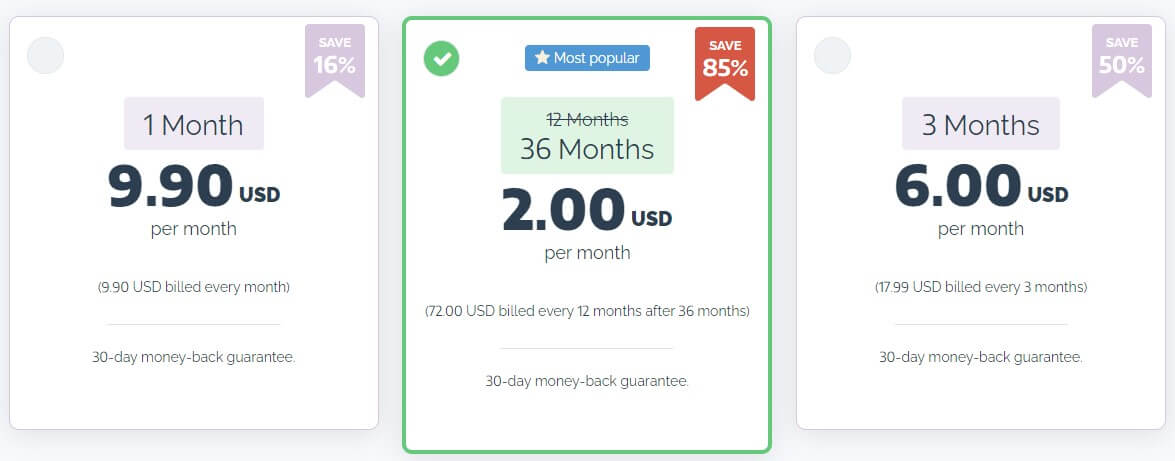
PrivateVPN has a solid monthly plan at $9.90 a month, which is a lot cheaper than ExpressVPN or CyberGhost. Its 3-month plan is $6 a month or $18 billed every 3 months. Finally, we have the cheapest plan, a 3-year deal at $2 a month or $72 for the first 3 years.
Beware that the renewal price is $72 every 12 months, so after the initial period, the provider is $6 a month basically. In the first 3 years, it’s an incredible value for the money but after that… well, it’s not something to write home about.
Its closest alternative is CyberGhost. This provider has a 2-year plan at just above $2 a month. As you can see, it’s a shorter commitment and the provider even packs a few free months on top of that – it depends on the period, as the service frequently changes its deals.
Regardless, CyberGhost will charge you around $57 for the first 2 years and then annually, which makes the price around $4.75 a month instead of $6 in PrivateVPN. ExpressVPN costs just above $6.6 a month for its cheapest annual plan with a 49% discount and 3 free months.
Therefore, we’d much rather use ExpressVPN or CyberGhost, to be honest. Not only they’re much better overall but as you can see, in the end, the price difference is kinda negligible, and CyberGhost ends up being cheaper, with a 45-day money-back guarantee.
Available Payment Methods
While not very generous with the server fleet, it’s quite the opposite in terms of payment methods. In our PrivateVPN review and test, we found that you can pay for it using:
- Apple Pay & Google Pay
- Credit/debit cards (VISA, MasterCard, Discover, American Express, …)
- PayPal
- Bitcoin
When using Bitcoin, you’ll need to transfer the required price manually, so there’s no third-party vendor. An awesome thing! PrivateVPN has a Bitcoin wallet, so you need to pay the amount of money depending on the selected plan by simply sending your Bitcoin as you’d do with your friends.
Enter the amount of BTC you want, copy and paste PrivateVPN’s wallet address, and you’re all set. The only thing you need to provide is the Transaction ID, which you’ll get in the Order ID. This will help the provider identify you and start your subscription.
How to Get a Refund from PrivateVPN
PrivateVPN offers a 30-day money-back guarantee as well. It’s present in all plans but the provider says you need to provide a reason for requesting a refund. We got refunded simply by saying we don’t like some of its aspects, after which, our refund request was processed immediately.
What We Don’t Like About PrivateVPN
As a whole, we think this wallet-friendly VPN is pretty dependable. However, there are some things we dislike, starting with a small server network. As said, we think it’s not enough for what PrivateVPN is trying to achieve, and if it ever gets more popular, the server fleet must see some improvements.
Another issue is the user experience, which isn’t excellent. Its apps aren’t the most optimized and smooth, which is often the sign of a low-quality VPN, which PrivateVPN surely isn’t. Our team also dislikes that WireGuard support is limited and requires manual setup.
Something non-experienced users will have no clue how to complete. Moving on, PrivateVPN’s streaming capabilities are subpar no matter the protocol your using – another big problem for many users. This is accompanied by average speeds that won’t blow you away.
While just a small nitpick, PrivateVPN could also improve its customer support response times slightly. Not that it’s a fatal flaw but small things like this make for a far better experience. Finally, we don’t like that the service has no third-party audits, which is a missed opportunity to make it more trustworthy.
How Do Other People Rate PrivateVPN?
PrivateVPN is a well-rated provider with thousands of favorable reviews online. People seem to quite enjoy this provider, as we can see on Trustpilot, Apple Store, and Google Play.
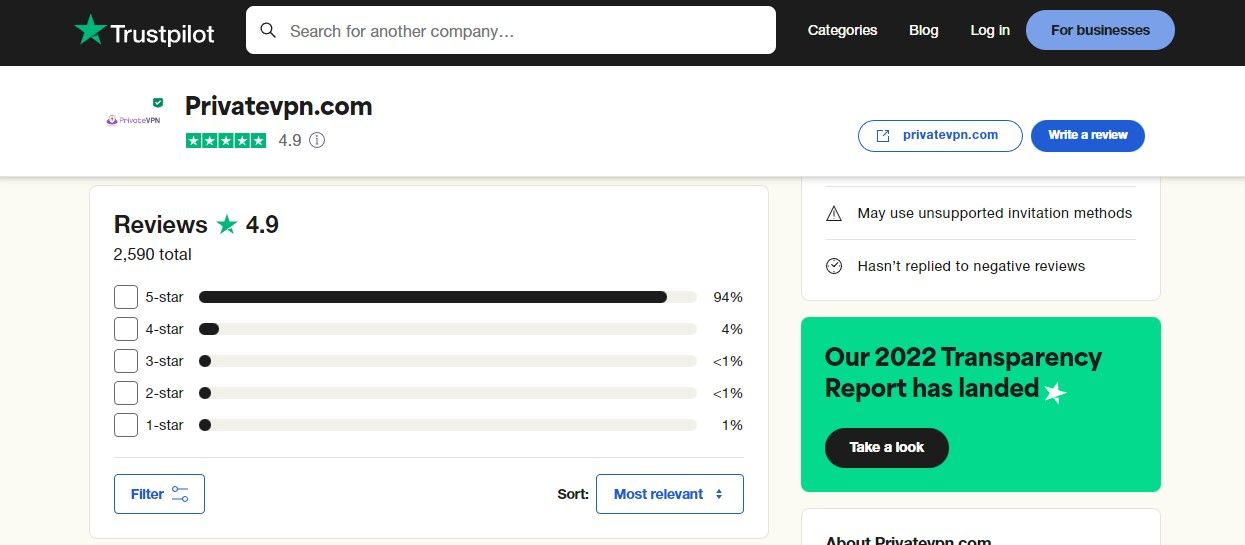
Trustpilot reviews show us that PrivateVPN has 4.9 out of 5 stars, which might be the highest ranking we’ve ever seen for a VPN service on this site. Users praise it left and right. They’re happy with many support team members, Carlo and Caleb, which seem to do a pretty good job – congrats.
On the technical side, users claim that the provider is decent for streaming, offering stable connections and solid speeds. Negative reviews actually revolve around customer support and sometimes refunds, which is strange, as 90% of the favorable reviews mention support as the highlight.

Moving on to Apple Store, the service has 4.6 stars – another impressive feat. Users praise its reliability and solid value for the price. Negative reviews mention particular internet problems, issues with customer support, and a small server park.

Google Play users enjoy its ease of use and affordable prices, along with decent performance and security. Interestingly, a few users complained about servers timing out on a few occasions, which is accompanied by typical bugs like the app turning off or disconnecting randomly.
With 3.8 stars on Google Play, it looks like Android users aren’t as happy as iOS users with this provider. While we’re at that, feel free to check our top free Android VPN services that you can use without paying a dime!
Conclusion: Good, With a Few Shortcomings
After everything said in this PrivateVPN review for 2025, we think it’s time to end this in-depth analysis. PrivateVPN is a solid VPN as a whole. It has a good array of security features, a no-logging policy, and applications for all devices and platforms.
No doubt, people will enjoy it even on routers and gaming consoles, plus typical desktop/mobile systems. On top of that, the service comes with dedicated IP addresses, which adds to variety and makes it more versatile than many of its rivals.
Coupled with decent support and cheap initial prices, it’s easy to see why many people are enticed by it. Our team, however, can’t recommend buying PrivateVPN after this review. We’re annoyed by its lack of servers and the unpolished user experience compared to many of its premium counterparts.
On top of that, the service has NO AUDITS, which is a big deal on its own. And since it’s based in Sweden, a 14-Eyes country, no one can guarantee anything from the privacy policy without a third-party certification. For this and many other reasons mentioned in our PrivateVPN review, we didn’t like it much.
We think CyberGhost is the best alternative to PrivateVPN. It’s cheaper, faster, more secure, and comes with an audited no-logging policy. It also has more nearly 50 times more servers in almost 100 countries, making it an obviously superior option.
If you’re willing to pay slightly more, ExpressVPN is our end-all-be-all choice. As the best VPN currently available, ExpressVPN is miles ahead of PrivateVPN.
